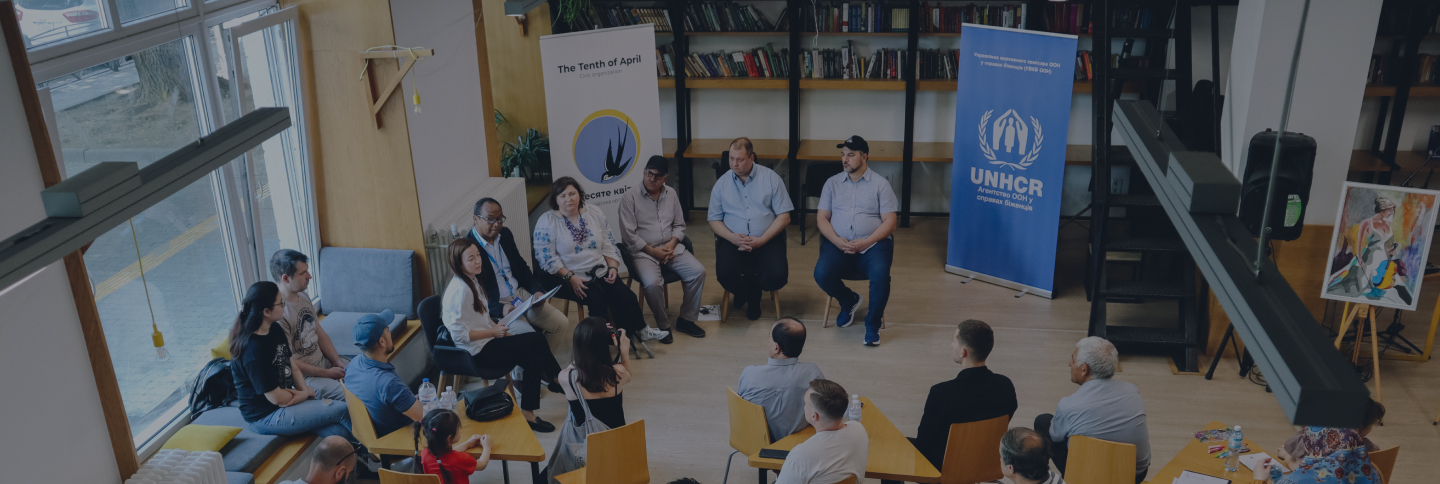The work with communities by the NGO “THE TENTH OF APRIL” is systematic. It includes informational and resource support, conducting trainings, workshops, and consultations, assistance in activity planning, networking with other civil society structures, knowledge exchange, and more.
Among the most important activities aimed at enhancing the organizational capacity of communities are training events. This component also includes networking opportunities and support for collaboration. To achieve this, we organize forums that involve communities from across our network, as well as joint training sessions with neighboring regions.
Systematic work with community requests provides experts from NGO “THE TENTH OF APRIL” with a clear understanding of the needs of civil society organizations and initiative groups in educational programs, which form the grounds for a series of trainings conducted both independently and as part of larger events such as forums or social cohesion activities. Ongoing surveys, sincere communication, and maintaining ties with communities allow us to accurately assess needs and sometimes assist in formulating requests for training if communities have not fully mastered certain types of activities.
The trainings themselves and other educational events are carefully planned to ensure that the learning process maximally contributes to material assimilation and provides practical aspects for applying acquired knowledge. For this purpose NGO “THE TENTH OF APRIL” has established long-standing relationships with leading experts in practical education. Our organization's trainers focus participants attention from the first seconds to the last moment of each event. Feedback regarding the work of trainers is overwhelmingly positive, often exceeding expectations regarding the quality of education.
For comfortable training sessions, planning includes not only the educational program but also additional components that allow participants to open up, feel secure, and experience a sense of belonging to one team. This includes engaging icebreakers, playful activities, and artistic programs typically featuring invited artists or media figures.
The richness of events, team-building exercises, group discussions unite participants based on their activities, directions, and personal preferences. As a result, joint projects and interaction among communities are fostered both within a region and across Ukraine as a whole.
A creative approach to organizing educational events entails continuously monitoring innovations in educational processes, including the integration of artificial intelligence into educational programs. Therefore, experts from NGO “THE TENTH OF APRIL” regularly attend relevant training sessions to ensure the quality of trainings for our communities meets modern standards of non-formal education.
At every training and forum, NGO “THE TENTH OF APRIL” receives numerous requests to organize such events more frequently because they inspire and, in addition to providing specific knowledge and skills, energize communities to continue their activities, support those who are tired, provide psychological relief, and offer sustainable recovery effects.
We also pay special attention to mobilisation events aimed at supporting communities and promoting the socialisation and integration of IDPs, as well as social cohesion between IDPs and the host population.
Sport events on the occasion of Children's Day, Family Day, St. Nicholas Day were held in the form of relay races, workshops, football tournaments and other games, with dozens and sometimes hundreds of children and adults participating from IDP families, the affected population and host communities. In addition to sports coaches, in some regions, psychologists and specialists working with children from the NGO “THE TENTH OF APRIL” were involved in children's events, working with both parents, providing information, and children who need additional attention. Famous local footballers were also involved in sports events, which had a positive impact on increasing the motivation of children and their parents to participate in sports.
Social cohesion measures introduced to support the capacity of local communities to address the problems of socially vulnerable populations affected by the hostilities were held in the format of a workshop or a forum of local communities. Both local and national experts were invited to such events, which became, without exaggeration, an event for the community and a significant impetus for development.

